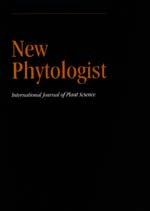Crossref Citations
This article has been cited by the following publications. This list is generated based on data provided by
Crossref.
Kazda, M.
and
Salzer, J.
2000.
Leaves of Lianas and Self‐Supporting Plants Differ in Mass per Unit Area and in Nitrogen Content.
Plant Biology,
Vol. 2,
Issue. 3,
p.
268.
KNOPS, JOHANNES MH
and
REINHART, KURT
2000.
Specific Leaf Area Along a Nitrogen Fertilization Gradient.
The American Midland Naturalist,
Vol. 144,
Issue. 2,
p.
265.
E. M., Spehn
J., Joshi
B., Schmid
M., Diemer
and
C., Körner
2000.
Above‐ground resource use increases with plant species richness in experimental grassland ecosystems.
Functional Ecology,
Vol. 14,
Issue. 3,
p.
326.
Erley, G. Schulte auf'm
Rademacher, I.
and
Kühbauch, W.
2001.
Die Blattanatomie eines schnell und eines langsam wachsenden Grases in Abhängigkeit von der Stickstoffversorgung.
Journal of Agronomy and Crop Science,
Vol. 187,
Issue. 4,
p.
231.
Garnier, E.
Laurent, G.
Bellmann, A.
Debain, S.
Berthelier, P.
Ducout, B.
Roumet, C.
and
Navas, M.‐L.
2001.
Consistency of species ranking based on functional leaf traits.
New Phytologist,
Vol. 152,
Issue. 1,
p.
69.
Garnier, E.
Shipley, B.
Roumet, C.
and
Laurent, G.
2001.
A standardized protocol for the determination of specific leaf area and leaf dry matter content.
Functional Ecology,
Vol. 15,
Issue. 5,
p.
688.
Wright, I. J.
and
Cannon, K.
2001.
Relationships between leaf lifespan and structural defences in a low‐nutrient, sclerophyll flora.
Functional Ecology,
Vol. 15,
Issue. 3,
p.
351.
Nardini, A.
2001.
Are Sclerophylls and Malacophylls Hydraulically Different?.
Biologia plantarum,
Vol. 44,
Issue. 2,
p.
239.
P'yankov, V. I.
Ivanov, L. A.
and
Lambers, H.
2001.
Plant Construction Cost in the Boreal Species Differing in Their Ecological Strategies.
Russian Journal of Plant Physiology,
Vol. 48,
Issue. 1,
p.
67.
Bellingham, P. J.
Walker, L. R.
and
Wardle, D. A.
2001.
Differential facilitation by a nitrogen‐fixing shrub during primary succession influences relative performance of canopy tree species.
Journal of Ecology,
Vol. 89,
Issue. 5,
p.
861.
Lavorel, S.
and
Garnier, E.
2002.
Predicting changes in community composition and ecosystem functioning from plant traits: revisiting the Holy Grail.
Functional Ecology,
Vol. 16,
Issue. 5,
p.
545.
Osborne, Colin P.
and
Beerling, David J.
2002.
A process‐based model of conifer forest structure and function with special emphasis on leaf lifespan.
Global Biogeochemical Cycles,
Vol. 16,
Issue. 4,
Martínez, F.
Lazo, Y. O.
Fernández‐Galiano, J. M.
and
Merino, J.
2002.
Root respiration and associated costs in deciduous and evergreen species of Quercus.
Plant, Cell & Environment,
Vol. 25,
Issue. 10,
p.
1271.
Wright, Ian J.
and
Westoby, Mark
2002.
Leaves at low versus high rainfall: coordination of structure, lifespan and physiology.
New Phytologist,
Vol. 155,
Issue. 3,
p.
403.
Grotkopp, Eva
Rejmánek, Marcel
and
Rost, Thomas L.
2002.
Toward a Causal Explanation of Plant Invasiveness: Seedling Growth and Life‐History Strategies of 29 Pine (Pinus) Species.
The American Naturalist,
Vol. 159,
Issue. 4,
p.
396.
Pensa, Margus
and
Sellin, Arne
2002.
Needle longevity of Scots pine in relation to foliar nitrogen content, specific leaf area, and shoot growth in different forest types.
Canadian Journal of Forest Research,
Vol. 32,
Issue. 7,
p.
1225.
Navas, Marie-Laure
and
Garnier, Eric
2002.
Plasticity of whole plant and leaf traits in Rubia peregrina in response to light, nutrient and water availability.
Acta Oecologica,
Vol. 23,
Issue. 6,
p.
375.
Westoby, Mark
Falster, Daniel S.
Moles, Angela T.
Vesk, Peter A.
and
Wright, Ian J.
2002.
Plant Ecological Strategies: Some Leading Dimensions of Variation Between Species.
Annual Review of Ecology and Systematics,
Vol. 33,
Issue. 1,
p.
125.
Martínez, F.
Lazo, Y. O.
Fernández‐Galiano, R. M.
and
Merino, J. A.
2002.
Chemical composition and construction cost for roots of Mediterranean trees, shrub species and grassland communities.
Plant, Cell & Environment,
Vol. 25,
Issue. 5,
p.
601.
Wright, Ian J.
Reich, Peter B.
and
Westoby, Mark
2003.
Least‐Cost Input Mixtures of Water and Nitrogen for Photosynthesis.
The American Naturalist,
Vol. 161,
Issue. 1,
p.
98.

